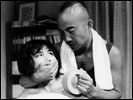A Perfect Education
- Year
- 1999
- Original title
- Kanzen Naru Shi-iku
- Japanese title
- 完全なる飼育
- Director
- Cast
- Running time
- 96 minutes
- Published
- 22 May 2001



by Jasper Sharp
Forty-three-year-old Iwazono's method of finding love is perhaps a little unorthodox. He hangs around by an abandoned canal until the bespectacled young schoolgirl Kuniko jogs past, then chloroforms her and handcuffs her to the bed of his ramshackle bachelor pad. As is to be expected, the pert young lass is at first a little unsettled to find herself waking up in the clutches of this 'hentai' (pervert), but Iwazano has more noble ambitions for her which he outlays over the breakfast table the following morning.
Many years ago Iwazono indecently assaulted a co-worker of his family business and was forced into marrying her by her family. A few years later his wife absconded, taking their children with her. Ever since this seminal event he has hankered after just one thing; a completely mutual, all-encompassing relationship; a 'perfect union of heart and body'. There's just one thing missing however - a willing partner.
Of course the idea of a slightly unhinged man imprisoning a virginal young 'ideal' female is hardly new in cinema, though previous variations on the theme have at least had some underlying concept behind them. William Wyler's 1965 adaptation of John Fowles' superior novel The Collector explored the inherent dramatic and psychological issues of the situation. Yasuzo Masumura's The Blind Beast (1968), in which a blind sculptor attempts to reproduce his captive as a perfect work of art drew cinematic parallels with the creative process, while Pedro Almodovar's Tie Me Up! Tie Me Down! (Atame, 1990) was a deliriously camp black comedy calculated to confront conservative notions of good taste head on.
A Perfect Education is essentially pitched as a mainstream romantic comedy in which captor and captive end up head over heels in love with one another. It seems to have no real agenda other than as a straightforward light-hearted drama and whereas it would be misleading to extrapolate anything more about Japanese society and sexual mores from such a matter-of-fact interpretation of the scenario in this adaption of the novel Joshikosei Yukai Shi-iku Jiken by Michiko Matsuda, it's obviously not an approach that's going to appeal to everyone.
Political correctness aside, however, it does have a couple of things in its favour. Naoto Takenaka, best known for his astonishing turn as the frisky-footed IT support guy from Masayuki Suo's brilliant ballroom comedy Shall We Dance?, and the perky young tarento Hijiri Kojima make for an attractive pairing. More surprising perhaps is the involvement of such an established industry heavyweight as Kaneto Shindo who directed the two atmospheric horror classics Onibaba and Kuroneko during the 60s.
Despite the rather untenable premise, Shindo's professionalism as a writer lends the film a curiously engaging air, though like his script for Kinji Fukasaku's The Geisha House (Omocha) the same year, the format appears to be to spend the bulk of the film establishing the character of Kuniko as a cutely attractive, independent, and sassy exemplar of emerging womanhood until the inevitable pay-off when we get to see her tits (an approach the similarly aged Bernardo Bertolucci seems to have taken with his recent work). Not one, but two teasing shower scenes of the fresh-faced young starlet in the first half hour hint that such an outcome is never in doubt, leading one through an hour of crafty 'will they, won't they' machinations before Iwazono finally gets to open the Pandora's box of unbridled female sexuality with the 10 minutes of raunchy coupling scenes that are undoubtedly the film's raison d'etre.
Kuniko offers herself initially to Iwazono as a means of quick escape from her predicament only to be rebuffed by her captor whose primary motivation is not sexual but emotional and wants her to come to him of her own volition. An escape attempt is offered when he takes his young Lolita on an away break to a hot spring resort where she goos and gushes as he offers her a school uniform so that they can masquerade together as father and daughter. Escape indeed she does, leaving him handcuffed in the hotel room, but then has a change of heart and returns to unchain him.
It is with plot developments such as this that A Perfect Education just simply doesn't ring true to my mind. However, to draw our attention away from the difficulties in lending the development of the couple's relationship any degree of verisimilitude the script is fleshed out with a host of subsidiary characters who inhabit Iwazono's tenement block, including the burly landlady (played by fellow Shall We Dance-er, Eriko Watanabe) and a cross-dressing salesman (Tetsuo director Shinya Tsukamoto).
A Perfect Education, prosaically directed by veteran TV director Ben Wada is simultaneously vapid, manipulative, slickly superficial, and above all incredibly silly, and yet, though probably for all the wrong reasons, remains a surprisingly watchable potboiler throughout. When seen in this light it is at least entertaining, though really little more than a quick one-off-the-wrist for an undeniably accomplished screenwriter and hardly worth going out of your way to see.